英语作业评价用语
- 格式:doc
- 大小:28.00 KB
- 文档页数:2
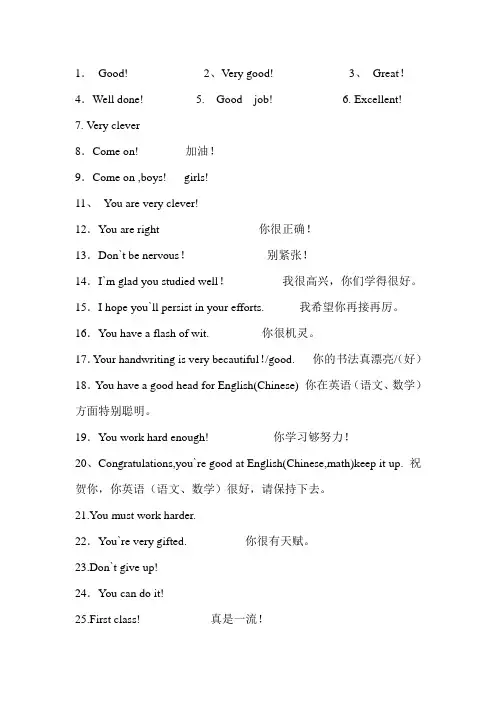
1.Good! 2、Very good! 3、Great!4.Well done! 5. Good job! 6. Excellent! 7. Very clever8.Come on! 加油!9.Come on ,boys! girls!11、You are very clever!12.You are right 你很正确!13.Don`t be nervous!别紧张!14.I`m glad you studied well!我很高兴,你们学得很好。
15.I hope you`ll persist in your efforts. 我希望你再接再厉。
16.You have a flash of wit. 你很机灵。
17.Your handwriting is very becautiful!/good. 你的书法真漂亮/(好)18.You have a good head for English(Chinese) 你在英语(语文、数学)方面特别聪明。
19.You work hard enough! 你学习够努力!20、Congratulations,you`re good at English(Chinese,math)keep it up. 祝贺你,你英语(语文、数学)很好,请保持下去。
21.You must work harder.22.You`re very gifted. 你很有天赋。
23.Don`t give up!24.You can do it!25.First class! 真是一流!26.You`re doing fine! 你做得好!27.I`m sure you`ll do better this time. 我相信你这一次会做得更好!英语作业评语不仅仅是对作业本身进行评价,也可以包括学习和生活的各个方面,它的语言形式更是丰富多彩,千变万化,既可以是一个词或一个短语,也可以是一句话、一个段落或一则格言。
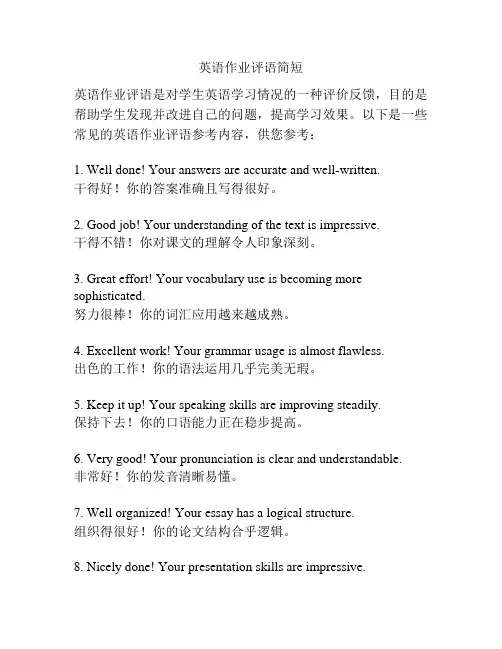
英语作业评语简短英语作业评语是对学生英语学习情况的一种评价反馈,目的是帮助学生发现并改进自己的问题,提高学习效果。
以下是一些常见的英语作业评语参考内容,供您参考:1. Well done! Your answers are accurate and well-written.干得好!你的答案准确且写得很好。
2. Good job! Your understanding of the text is impressive.干得不错!你对课文的理解令人印象深刻。
3. Great effort! Your vocabulary use is becoming more sophisticated.努力很棒!你的词汇应用越来越成熟。
4. Excellent work! Your grammar usage is almost flawless.出色的工作!你的语法运用几乎完美无瑕。
5. Keep it up! Your speaking skills are improving steadily.保持下去!你的口语能力正在稳步提高。
6. Very good! Your pronunciation is clear and understandable.非常好!你的发音清晰易懂。
7. Well organized! Your essay has a logical structure.组织得很好!你的论文结构合乎逻辑。
8. Nicely done! Your presentation skills are impressive.做得很好!你的演讲技巧令人印象深刻。
9. Good effort! Your writing style is becoming more expressive. 努力很好!你的写作风格越来越富有表现力。
10. Pay attention to spelling errors. Make sure to proofread your work.注意拼写错误。
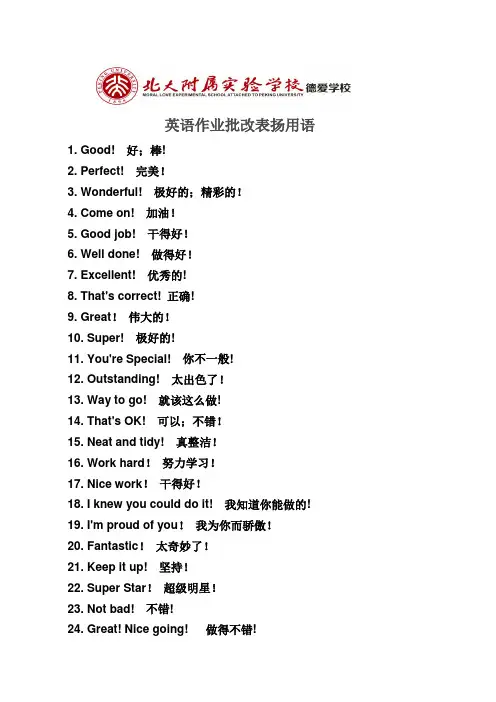
英语作业批改表扬用语1. Good! 好;棒!2. Perfect! 完美!3. Wonderful! 极好的;精彩的!4. Come on! 加油!5. Good job! 干得好!6. Well done! 做得好!7. Excellent! 优秀的!8. That's correct! 正确!9. Great!伟大的!10. Super! 极好的!11. You're Special! 你不一般!12. Outstanding! 太出色了!13. Way to go! 就该这么做!14. That's OK! 可以;不错!15. Neat and tidy! 真整洁!16. Work hard!努力学习!17. Nice work!干得好!18. I knew you could do it! 我知道你能做的!19. I'm proud of you!我为你而骄傲!20. Fantastic!太奇妙了!21. Keep it up! 坚持!22. Super Star!超级明星!23. Not bad! 不错!24. Great! Nice going! 做得不错!25. Looking good! 看上去不错!26. That's the best! 真出色!27. Now you've got it! 现在你做到了!28. You can do it! 你能做到!29. How nice! 多好啊!30. Let's try again! 再试试!31. You care! 你很认真!32. Try your best. Much better! 好多了!33. Pay attention to you writing! That's right! 不错!34. Good thinking. 好思路。
35. Your handwriting is very nice! 你的字很漂亮!36. A smart boy /girl! Outstanding! 太出色了!37. Work hard! Th at’s great. 棒极了。

学生作业用语大全(英语老师必备)学生作业用语大全(英语老师必备)一、表扬学生的作业1. Well done!(干得好!)2. Excellent job!(做得非常棒!)3. Great work!(好极了!)4. You've really impressed me with your homework.(你的作业真让我刮目相看。
)5. You've put in a lot of effort on this assignment.(你在这个作业上投入了很多心血。
)6. I'm proud of your hard work on this task.(你在这项任务上的努力让我感到骄傲。
)7. Your homework is outstanding.(你的作业出色。
)8. Keep up the good work!(继续保持好的工作!)9. You've really understood the concept well.(你对这个概念理解得很好。
)二、指出学生作业中的错误1. There are a few mistakes in your homework.(你的作业有几处错误。
)2. I've noticed a couple of errors in your assignment.(我注意到你的作业中有几处错误。
)3. Please check your spelling in this section.(请检查一下这个部分的拼写。
)4. You've made a small error here.(你在这里犯了一个小错误。
)5. I would suggest revising this paragraph to improve accuracy.(我建议修改这一段以提高准确性。
)6. It seems like you've misunderstood the question.(看起来你误解了这个问题。
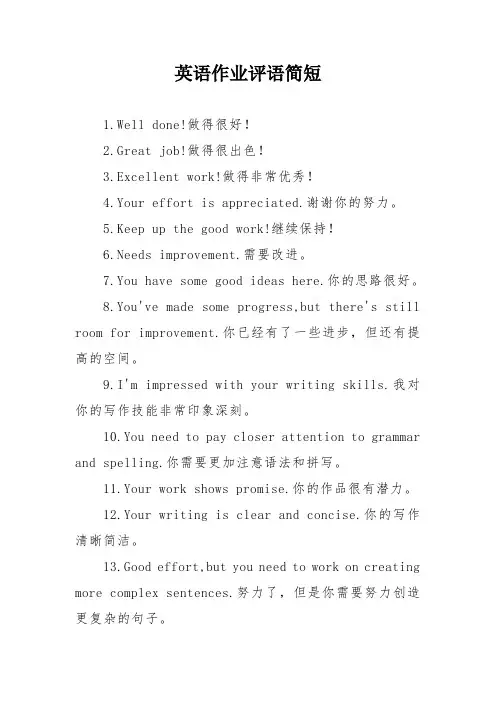
英语作业评语简短1.Well done!做得很好!2.Great job!做得很出色!3.Excellent work!做得非常优秀!4.Your effort is appreciated.谢谢你的努力。
5.Keep up the good work!继续保持!6.Needs improvement.需要改进。
7.You have some good ideas here.你的思路很好。
8.You've made some progress,but there's still room for improvement.你已经有了一些进步,但还有提高的空间。
9.I'm impressed with your writing skills.我对你的写作技能非常印象深刻。
10.You need to pay closer attention to grammar and spelling.你需要更加注意语法和拼写。
11.Your work shows promise.你的作品很有潜力。
12.Your writing is clear and concise.你的写作清晰简洁。
13.Good effort,but you need to work on creating more complex sentences.努力了,但是你需要努力创造更复杂的句子。
14.You have a good understanding of the material.你对材料有很好的理解。
15.Your work demonstrates creativity and originality.你的作品展示了创造性和独创性。
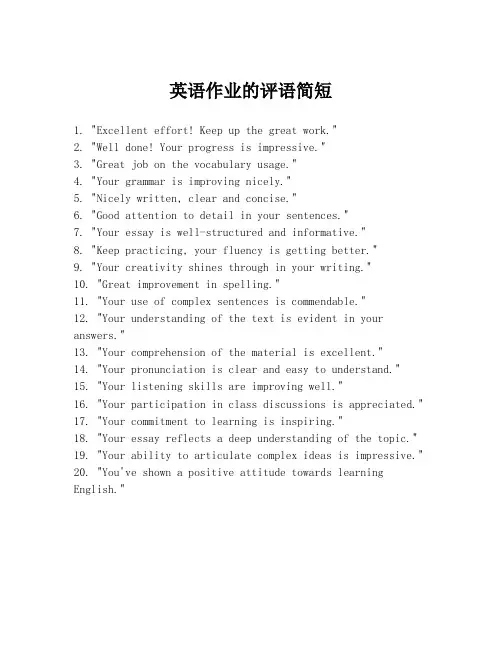
英语作业的评语简短1. "Excellent effort! Keep up the great work."2. "Well done! Your progress is impressive."3. "Great job on the vocabulary usage."4. "Your grammar is improving nicely."5. "Nicely written, clear and concise."6. "Good attention to detail in your sentences."7. "Your essay is well-structured and informative."8. "Keep practicing, your fluency is getting better."9. "Your creativity shines through in your writing."10. "Great improvement in spelling."11. "Your use of complex sentences is commendable."12. "Your understanding of the text is evident in your answers."13. "Your comprehension of the material is excellent."14. "Your pronunciation is clear and easy to understand."15. "Your listening skills are improving well."16. "Your participation in class discussions is appreciated."17. "Your commitment to learning is inspiring."18. "Your essay reflects a deep understanding of the topic."19. "Your ability to articulate complex ideas is impressive."20. "You've shown a positive attitude towards learning English."。
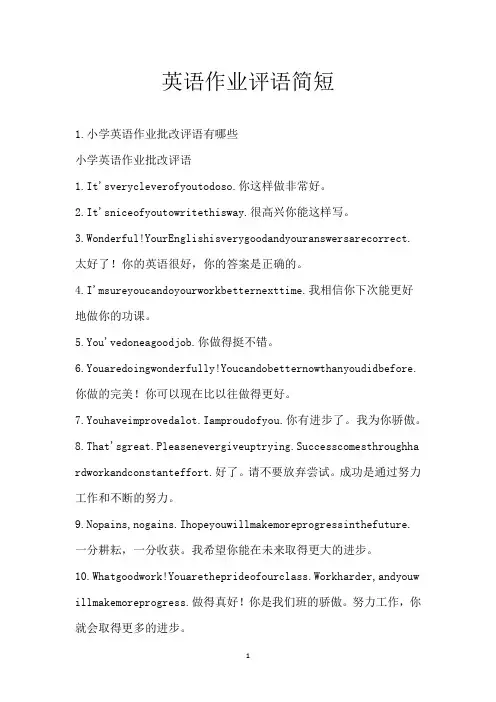
英语作业评语简短1.小学英语作业批改评语有哪些小学英语作业批改评语1.It'sverycleverofyoutodoso.你这样做非常好。
2.It'sniceofyoutowritethisway.很高兴你能这样写。
3.Wonderful!YourEnglishisverygoodandyouranswersarecorrect.太好了!你的英语很好,你的答案是正确的。
4.I'msureyoucandoyourworkbetternexttime.我相信你下次能更好地做你的功课。
5.You'vedoneagoodjob.你做得挺不错。
6.Youaredoingwonderfully!Youcandobetternowthanyoudidbefore.你做的完美!你可以现在比以往做得更好。
7.Youhaveimprovedalot.Iamproudofyou.你有进步了。
我为你骄傲。
8.That'sgreat.Pleasenevergiveuptrying.Successcomesthroughha rdworkandconstanteffort.好了。
请不要放弃尝试。
成功是通过努力工作和不断的努力。
9.Nopains,nogains.Ihopeyouwillmakemoreprogressinthefuture.一分耕耘,一分收获。
我希望你能在未来取得更大的进步。
10.Whatgoodwork!Youaretheprideofourclass.Workharder,andyouw illmakemoreprogress.做得真好!你是我们班的骄傲。
努力工作,你就会取得更多的进步。
2.求英语老师批改学生作业时的评语,越多越好一、作业评语要符合学生的实际水平评语是写给学生看的,所以一方面评语要使用学生能看得懂的英语来写,所使用的词汇和语法不能过高或过低于学生的现有水平,要切合学生的实际水平,符合学生的个性心理发展需要;另一方面要做到循序渐进,由易到难,能够起到"跳一跳,摘到桃子"的作用,也就是说学生通过上下文的猜测或借助于词典就能理解。
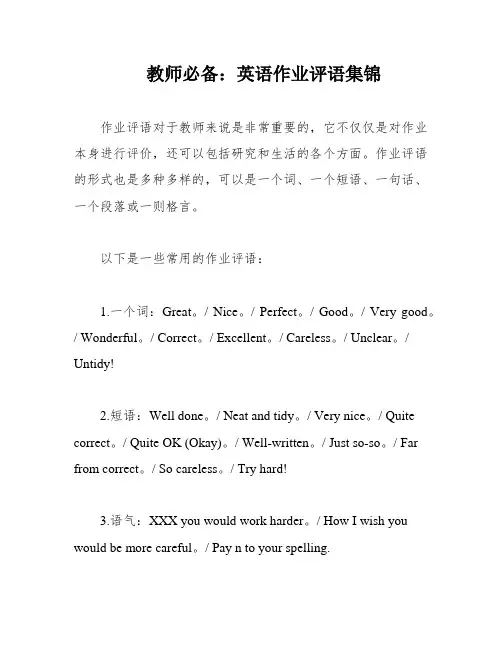
教师必备:英语作业评语集锦作业评语对于教师来说是非常重要的,它不仅仅是对作业本身进行评价,还可以包括研究和生活的各个方面。
作业评语的形式也是多种多样的,可以是一个词、一个短语、一句话、一个段落或一则格言。
以下是一些常用的作业评语:1.一个词:Great。
/ Nice。
/ Perfect。
/ Good。
/ Very good。
/ Wonderful。
/ Correct。
/ Excellent。
/ Careless。
/ Unclear。
/ Untidy!2.短语:Well done。
/ Neat and tidy。
/ Very nice。
/ Quite correct。
/ Quite OK (Okay)。
/ Well-written。
/ Just so-so。
/ Far from correct。
/ So careless。
/ Try hard!3.语气:XXX you would work harder。
/ How I wish you would be more careful。
/ Pay n to your spelling.4.格言:研究无坦途。
—There is no royal road to learning。
/ 光阴一去不复返。
—Lost time is never found again。
/ 研究从不嫌晚。
—It's never too late to learn。
/ 熟能生巧。
—Practice makes perfect。
/ 不劳无获。
—No pains。
no XXX 昨日不再来。
—No one can call back yesterday。
/ 放弃就是失败。
—To giveup is to fail。
/ 百说不如一干。
—ns speak louder than words。
/有志者事竟成。
—Where there is a will。
there is a way。
/ 一知半解很危险。
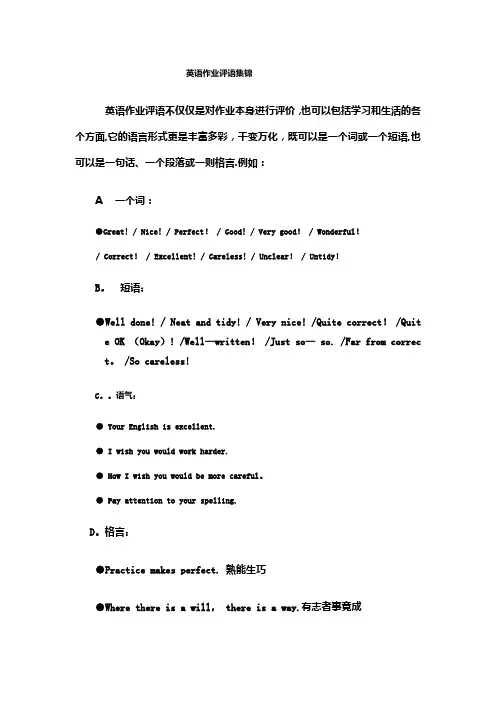
英语作业评语集锦英语作业评语不仅仅是对作业本身进行评价,也可以包括学习和生活的各个方面,它的语言形式更是丰富多彩,千变万化,既可以是一个词或一个短语,也可以是一句话、一个段落或一则格言.例如:A一个词:●Great! / Nice! / Perfect! / Good! / Very good! / Wonderful!/ Correct! / Excellent! / Careless! / Unclear! / Untidy!B。
短语:●Well done! / N eat and tidy! / Very nice! /Quite correct! /Quite OK (Okay)! /Well—written! /Just so— so. /Far from correct。
/So careless!C。
语气:● Your English is excellent.● I wish you would work harder.● How I wish you would be more careful。
● Pay attention to your spelling.D。
格言:●Practice makes perfect. 熟能生巧●Where there is a will, there is a way.有志者事竟成●A good beginning is half done. 良好的开端是成功的一半.● A man becomes learned by asking questions。
不耻下问才能有学问。
●A man cannot spin and reel at the same time。
一心不能二用。
●C are and diligence bring luck. 谨慎和勤奋才能抓住机遇。
●Complacency is the enemy of study. 学习的敌人是自己的满足。
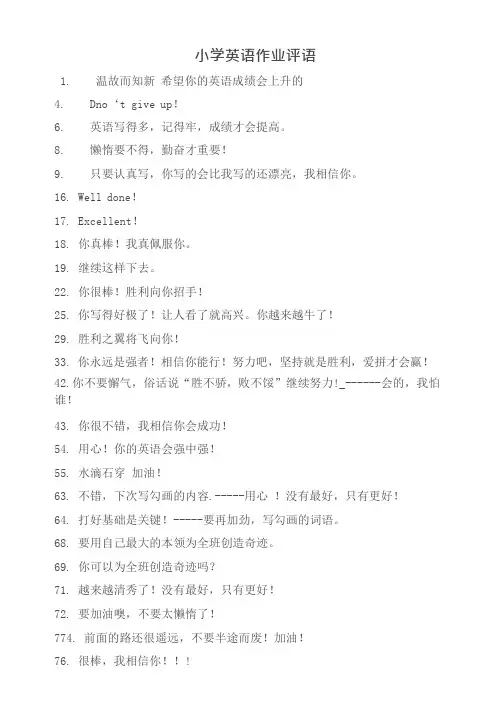
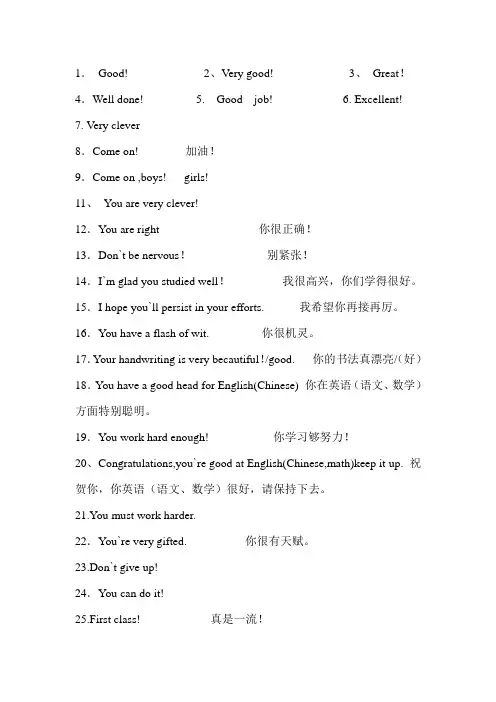
1.Good! 2、Very good! 3、Great!4.Well done! 5. Good job! 6. Excellent! 7. Very clever8.Come on! 加油!9.Come on ,boys! girls!11、You are very clever!12.You are right 你很正确!13.Don`t be nervous!别紧张!14.I`m glad you studied well!我很高兴,你们学得很好。
15.I hope you`ll persist in your efforts. 我希望你再接再厉。
16.You have a flash of wit. 你很机灵。
17.Your handwriting is very becautiful!/good. 你的书法真漂亮/(好)18.You have a good head for English(Chinese) 你在英语(语文、数学)方面特别聪明。
19.You work hard enough! 你学习够努力!20、Congratulations,you`re good at English(Chinese,math)keep it up. 祝贺你,你英语(语文、数学)很好,请保持下去。
21.You must work harder.22.You`re very gifted. 你很有天赋。
23.Don`t give up!24.You can do it!25.First class! 真是一流!26.You`re doing fine! 你做得好!27.I`m sure you`ll do better this time. 我相信你这一次会做得更好!英语作业评语不仅仅是对作业本身进行评价,也可以包括学习和生活的各个方面,它的语言形式更是丰富多彩,千变万化,既可以是一个词或一个短语,也可以是一句话、一个段落或一则格言。
英语作业评语集锦英语作业评语不仅仅是对作业本身进行评价,也可以包括学习和生活的各个方面,它的语言形式更是丰富多彩,千变万化,既可以是一个词或一个短语,也可以是一句话、一个段落或一则格言。
例如:A一个词:●Great! / Nice! / Perfect! / Good! / Very good! / Wonderful!/ Correct! / Excellent! / Careless! / Unclear! / Untidy!B. 短语:●Well done! / N eat and tidy! / Very nice! /Quite correct! /Quite OK (Okay)! /Well-written! /Just so- so. /Far from correct. /So careless!C..语气:● Your English is excellent.● I wish you would work harder.● How I wish you would be more careful.● Pay attention to your spelling.D.格言:●Practice makes perfect. 熟能生巧●Where there is a will, there is a way.有志者事竟成●A good beginning is half done. 良好的开端是成功的一半。
● A man becomes learned by asking questions. 不耻下问才能有学问。
●A man cannot spin and reel at the same time. 一心不能二用。
●C are and diligence bring luck. 谨慎和勤奋才能抓住机遇。
●Complacency is the enemy of study. 学习的敌人是自己的满足。
英语作业评语集锦英语作业评语不仅仅是对作业本身进行评价,也可以包括学习和生活的各个方面,它的语言形式更是丰富多彩,千变万化,既可以是一个词或一个短语,也可以是一句话、一个段落或一则格言。
例如:A一个词:●Great! / Nice! / Perfect! / Good! / Very good! / Wonderful!/ Correct! / Excellent! / Careless! / Unclear! / Untidy!B. 短语:●Well done! / Neat and tidy! / Very nice! /Quite correct! /Quite OK (Okay)! /Well-written! /Just so- so. /Far from correct. /So careless!C..语气:● Your English is excellent.● I wish you would work harder.● How I wish you would be more careful.● Pay attention to your spelling.D.格言:●Practice makes perfect. 熟能生巧●Where there is a will, there is a way.有志者事竟成●Agoodbeginningishalfdone.良好的开端是成功的一半。
● Amanbecomeslearnedbyaskingquestions. 不耻下问才能有学问。
●Amancannotspinandreelatthesametime. 一心不能二用。
●Careanddiligencebringluck. 谨慎和勤奋才能抓住机遇。
●Complacencyistheenemyofstudy.学习的敌人是自己的满足。
●Confidenceinyourselfisthefirststepontheroadtosuccess.自信是走向成功的第一步。
英语作业的评论语1. "Excellent use of vocabulary! Keep expanding your word bank."2. "Your sentence structure is improving nicely. Great job!"3. "I can see you've put a lot of effort into your writing. Well done!"4. "Your understanding of grammar has really come a long way."5. "Your essay is well-organized and easy to follow. Keep up the good work."6. "Your creative use of language is impressive. Keep exploring new ways to express yourself."7. "Your grasp of idiomatic expressions is commendable."8. "Your pronunciation has improved significantly. Keep practicing!"9. "Your listening skills are getting better with each assignment."10. "You've shown great progress in your reading comprehension."11. "Your dialogues are engaging and natural. Keep refining your conversational skills."12. "Your spelling has improved tremendously. Keep checking your work."13. "Your essay is insightful and well-argued. Excellent work!"14. "Your use of descriptive language really brings your writing to life."15. "Your attention to detail in your writing iscommendable."16. "Your ability to summarize complex ideas is very impressive."17. "Your research skills are evident in the depth of your assignments."18. "Your writing style is becoming more confident and articulate."19. "Your understanding of the text has deepened with each assignment."20. "Your commitment to improving your English is paying off. Keep it up!"。
1.Excellent Work!你的作业完成得非常出色,继续保持!2.Great Effort!你付出了很大的努力,成果显著。
3.Well Done!做得很好,继续保持这种水平。
4.Good Job!好样的,你的作业完成得很好。
5.Nice Writing!书写工整,看起来很舒适。
6.Keep It Up!继续保持,你的进步很明显。
7.Youre Improving!你正在进步,不要停止。
8.Try Harder Next Time.下次再努力一些。
9.Pay Attention to Spelling.注意拼写,有些单词拼错了。
10.Grammar Needs Work.语法方面需要加强。
11.Check Your Punctuation.检查你的标点符号,有些地方使用不当。
12.Be More Specific.尝试更具体一些,你的论点会更有力。
13.Expand on Your Ideas.扩展你的想法,让内容更丰富。
14.Stay on Topic.保持主题一致,不要偏离中心。
e More Variety in Vocabulary.使用更多样化的词汇,避免重复。
16.Sentence Structure Could Be Better.句子结构可以更优化。
17.Your Ideas Are Interesting.你的观点很有趣,继续探索。
18.Make Sure to Proofread.确保校对,避免小错误。
19.Good Use of Vocabulary.词汇使用得很好,继续保持。
20.Your Writing Style is Engaging.你的写作风格很吸引人,继续保持。
21.More Examples Would Help.如果能举更多例子,会更有说服力。
22.Your Conclusion Could Be Stronger.结论可以更加有力。
23.Excellent Use of Transitions.过渡使用得非常好。
1.Good! 2、Very good! 3、Great!4.Well done! 5. Good job! 6. Excellent! 7. Very clever8.Come on! 加油!9.Come on ,boys! girls!11、You are very clever!12.You are right 你很正确!13.Don`t be nervous!别紧张!14.I`m glad you studied well!我很高兴,你们学得很好。
15.I hope you`ll persist in your efforts. 我希望你再接再厉。
16.You have a flash of wit. 你很机灵。
17.Your handwriting is very becautiful!/good. 你的书法真漂亮/(好)18.You have a good head for English(Chinese) 你在英语(语文、数学)方面特别聪明。
19.You work hard enough! 你学习够努力!20、Congratulations,you`re good at English(Chinese,math)keep it up. 祝贺你,你英语(语文、数学)很好,请保持下去。
21.You must work harder.22.You`re very gifted. 你很有天赋。
23.Don`t give up!24.You can do it!25.First class! 真是一流!26.You`re doing fine! 你做得好!27.I`m sure you`ll do better this time. 我相信你这一次会做得更好!英语作业评语不仅仅是对作业本身进行评价,也可以包括学习和生活的各个方面,它的语言形式更是丰富多彩,千变万化,既可以是一个词或一个短语,也可以是一句话、一个段落或一则格言。
.精选文档 .英语作业考语100 条小学英语作业考语100 条1.你写的真好呀! PF! PF!2.写清楚,你也会变得漂亮。
3.希望你能成功。
4. Dn ‘ t give up!5.你真棒!你能行!6.英语写得多,记得牢,成绩才会提升。
7.你进步了,太棒了!奖你 ; 画一朵小花8.懒散要不得,勤劳才重要!9.只需仔细写,你写的会比我写的还漂亮,我相信你。
10.把英语写雅观,你绝对不会是英语的蛋白质!教本了啦!11.你感觉你是为他人而写作业吗 ?那你就错了!12.乖仔,把单词写雅看法好不好?13.风起了,飞吧,努力翱翔。
14.持续努力。
15.努力!相信你会成功 .16. ell dne!17.Exellent !18.你真棒!我真钦佩你。
19.持续这样下去。
20.要写标准!21.温故而知新希望你的英语成绩会上涨的22.你很棒!成功向你挥手!23.你人旺,福旺,成绩旺,你必定能旺!24.极品呀!绝品英语啊!25.你写得好极了!让人看了就快乐。
你越越牛了!26.你是二组的骄傲!27.你最牛了!28.让人看了就舒畅!29.成功之翼将飞向你!30.妒忌死我了!你竟然写得这么好!31.恭贺你,你已经满载英语了。
32.特别好,努力!加油!33.你永久是强者!相信你能行!努力吧,坚持就是成功,爱拼才会赢!34.五颗星35.笑容36.你很棒,你要加油,考个好成绩。
37.你人旺,福旺,运气旺。
你必定会旺起!38.很好。
39.写得真漂亮!40.你要努力,在明日的考试中不重要张,祝你考个好成绩,加油!41.你很棒,考试必定不错吧!——还不错呢,糊了,唉!42.你不要懈气,俗语说“胜不骄,败不馁”持续努力!_------ 会的,我怕谁!43.你很不错,我相信你会成功!44.很不错,我钦佩你的信心!45.我看你写的英语很美,可为何总不占优势呢?加油吧!46.我们组又出了一位“女强者”必定要加油! G! G! G!47.你很棒呦!你的成绩必定会旺起!48.你要加油!不要在起跑线上停下 .49.你的成绩必定会旺上加旺!50.好美呀!持续努力,加油吧!! !51.说真话,我很钦佩你写的英语呦!52.很不错,你是我们组的英语楷模!53.Very Gd! 奖你一杯葡萄汁画一杯葡萄汁54.专心!你的英语会强中强!55.磨铁成针加油!56.我们为你写的英语感觉骄傲!57.光写不记 =白写要记着呦!58.你的成绩必定会是一架货真价实的火箭直线上涨!59.你不要光写题,写一写我们钩的要点句子多好呀!60.你有了很大的进步, G! G!61.关于你已经不错了,可是每个单词和每个单词之间要有距离噢62.写得齐整,你也会英俊!他人看了也舒畅。
英语作业评语不仅仅是对作业本身进行评价,也可以包括学习和生活的各个方面,它的语言形式更是丰富多彩,千变万化,既可以是一个词或一个短语,也可以是一句话、一个段落或一则格言。
例如:
A 一个词:
●Great! / Nice! / Perfect! / Good! / Very good! / Wonderful! / Correct! / Excellent! / Careless! / Unclear! / Untidy!
B. 短语:
●Well done! / Neat and tidy! / Very nice! /Quite correct! /Quite OK (Okay)! /Well-written! /Just so- so. /Far from correct. /So careless!
C. . 语气:
●Your English is excellent.
●I wish you would work harder.
●How I wish you would be more careful.
●Pay attention to your spelling.
D. 格言:
●Practice makes perfect. 熟能生巧
●Where there is a will, there is a way. 有志者事竟成
●A good beginning is half done.
良好的开端是成功的一半。
●A man becomes learned by asking questions. 不耻下问才能有学问。
●A man cannot spin and reel at the same time. 一心不能二用。
●Care and diligence bring luck. 谨慎和勤奋才能抓住机遇。
●Complacency is the enemy of study. 学习的敌人是自己的满足。
●Confidence in yourself is the first step on the road to success. 自信是走向成功的第一步。
●Industry is the parent of success. 勤奋是成功之母。
●.Never deter till tomorrow that which you can do today. 今日事须今日毕,切勿拖延到明天。
.
●.Diligence is the mother of good fortune. 勤勉是好运之母。
●Failure is the mother of success. 失败是成功之母
E. 句型:
●That's OK! / That’s all right! / That's wrong. What a good job you have done! /What a good boy you are! /
●How carefully you've worked! /How nice your work is!
●Now you can do better than before.
●Your handwriting is excellent!
●Your English will become better if you work harder.
●It is clever of you to do so. /It's nice of you to say so. /It's careless of you to write this way.
●You've done so nicely. /You've made such a careless mistake!
●Try to do better next time! /See what you've done! / Correct your mistakes. /Don't do that again!
●I find you've made a lot of progress! I think you can work more carefully next time. I' m sorry you've made so many mistakes in your work.
●Your handwriting is not so nice as Maggie's. You've done better than last time. You can do best of all if you try harder.
F . 段落:
●Although you have not been successful, you have done better than ever Success belongs to the diligent learners. I am sure you will make more and more progress if you keep on practicing your spoken English.
G.
“What a beautiful handwriting! If only be more careful!”(多漂亮的书法呀!要是作业再仔细一点就好了!)
“Well done! But would you please improve your handwriting?”(做得很好!再设法改善一下你的书法怎么样?)
“I'm so glad to see your great progress in your exercises.”(你的作业进步这么大,我真高兴!)
“I'm pleased that you have made so great progress now. Thank you! (很高兴看见你现在取得这么大的进步。
谢谢你!)
“Try again; I'm sure you will do better next time!”(再努一把力!相信你下次会做得更好!)“Well done! Try to be better next time, will you?”(真棒!争取下次更好,行吗?)
“If only your handwriting were better! ”(要是你的字能写工整点该多好啊!)
“How I wish you did your homework all by yourself! I think you can!”(我多希望你能自己完成作业啊!我相信你能做到。
)
“Would you please pay attention to……?”(请你注意……好吗?)
“I'm afraid you used Chinglish here, do you think so?”(恐怕你在这儿用的是中国式英语,你说呢?)(“Chinglish ”是“Chinese English”的幽默说法)
“I’ve found your handwriting is better than before. Thank you!”(我已发现你的字比以前好了,谢谢你!)
“Wonderful in spite of a few mistakes! You have made progress now!”(好极了!尽管有点小错,但你已经进步了!)英语作业评语自上初三以来,许多同学便开始抱怨,英语怎么这么难学了,课文也难了,语法也不是一看就会了,明显感觉难度加大了很多!好多同学也开始慢慢的对英语失去了兴趣,有的就干脆开始放弃英语了。
这时候,学校领导要求老师们在批改作业的时候要适当的加些鼓励性的评语。
对啊,我何不利用写作业评语的方法来激励某些同学呢! 还记得初一初二时的英语作业,每次要么就是听写单词,短语,要么就是抄课文,翻译课文。
每次都是一个呆板的“pass ”或“A ,A- ,B+... ”,看多了学生也就觉得乏味,麻木了. 觉得作业只是一件任务,只忙于去应付作业,久而久之便会慢慢地对英语失去了兴趣。
现在已经到了初三的关键时期了,这时候,适当的评语也许能起到很好的作用。
例如:“I believe you can do it better next time! ”“You must believe in yourself! ”“You have made much progress ,work harder and you will realize your dream. ”“Excellent! ”“Perfect! ”一句好的评语,不仅能反映学生解题的正误,对学生进行恰当的学法指导,使学生形成正确的解题思路和方法,而且还能挖掘学生的潜在能力。
通过积极引导,拓宽学生的思路,培养学生自主创新精神。